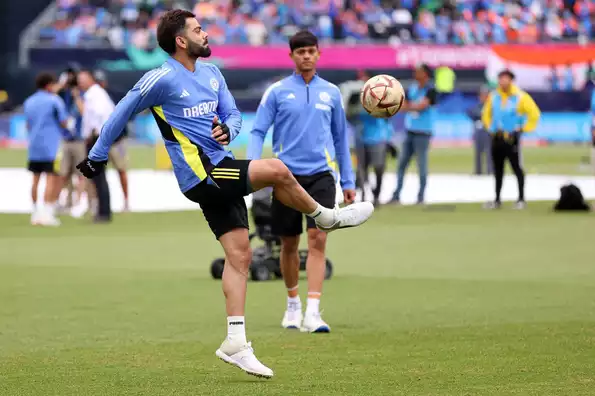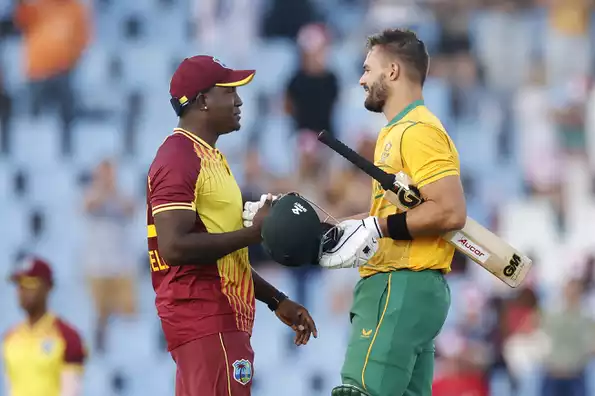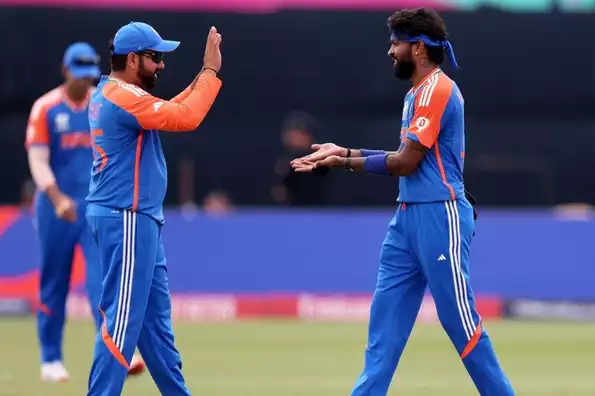What can be considered as the turning point in Afghanistan’s cricket in their sensational run to the semifinals of the T20 World Cup? Many may argue that it was the form of their opening batters, Rahmanullah Gurbaz and Ibrahim Zadran, that allowed them to lay the foundation for all of their famous wins. Others may point to the terrific returns for Fazalhaq Farooqi and Naveen-ul-Haq, who gave Afghanistan’s bowling attack a new edge and excellently complemented their traditional spin strengths.
However, a facet to their game slipped by somewhat unnoticed. As a unit and many times under howling, windy conditions, Afghanistan were solid in the field and kept the pressure on the opposition with excellent fielding, both inside the ring and out of it.
This fielding uptick was underscored by Noor Ahmad’s excellent catch diving forward at backward point to dismiss Glenn Maxwell at a crucial juncture in their Super 8 clash at St Vincent. Curiously, it was a dropped catch that allowed the maverick Australia all-rounder to produce a World Cup classic knock eight months ago in Mumbai. He was on his way to an encore when Gulbadin Naib and Noor combined to halt him leading to one of the most famous nights in Afghanistan’s cricket.
Catches win matches is a old phrase in cricket and it turned to be true once more when Noor Ahmed dives forward and takes a sharp low catch of Glenn Maxwell during the magical spell of Gulbadin Naib when the Australian was threatening to break their hearts once.
Fielding also played a key role in Afghanistan’s defence of 115 against Bangladesh, paving the way for Afghanistan’s win and qualification to the semifinals. In the 18th over of that chase, Farooqi produced a diving effort at the point boundary to deny Taskin Ahmed and Bangladesh a crucial boundary that would have brought the required runs into the single digits. Two balls later, Taskin was dismissed and Bangladesh fell behind on the DLS sheet.
Speaking to Cricbuzz, fielding coach Shane McDermott said he and the team were not going to sit on the laurels and that they still had a long way to go as far as achieving fielding goals was concerned.
“The initial major challenge was ensuring we had a clear plan focusing on controllable aspects aligned with specific performance indicators. We consistently measure and review these indicators after each performance. Trust in our methods must be individually earned, but overall, the statistics show that our off-ball efforts and opportunity-taking have been impressive,” McDermott said.
“Full credit to the players for this [improvement in fielding] and we aim to maintain this habit, starting with the next game, regardless of its significance. Our goal is to be the best in the world and we will not rest until we achieve this. We all know that good fielding can be a match-winning skill. Seeing evidence of this in some recent performances, the team and management have fully embraced the challenge of improving daily in the field and have prioritized our fielding development.
“This was evident in our recent game against Australia and other opponents in the tournament. The players’ work ethic and attitude are commendable, and we aim to elevate our fielding to the highest level with the goal of becoming the best in the world,” he said.
McDermott, who was roped by the Afghanistan Cricket Board in January 2024 and joined the squad the following month during their series against Sri Lanka, said that he and the rest of the support staff were developing the squad with a keen eye on fielding paramaters. Amid Key Performance Indicators is measuring body language. They are also ensuring that that certain players field in certain specific positions.
“We have included the measure of body language as part of our goals and KPIs. We pride ourselves on reacting positively to failure and developing a fearless attitude. This approach has helped us handle pressure situations well,” McDermott said.
“The goal is for our entire squad to be capable of performing in all areas of the ground when fielding. However, we also ensure that, under certain conditions and against specific opposition, the right players are positioned in key areas – hot spots – as often as possible.
“The best teams can adapt to varying conditions worldwide, including different angles on certain wickets, hot spots, and wind or dew during night matches. We have planned well throughout the tournament, focusing on controlling what we can and bringing our best effort daily. Doing the basics well is essential to give us the best chance of fielding effectively, both on the ground and when the ball is in the air.
McDermott added that he is impressed with the way senior guys like Mohammad Nabi, Gulbadin Naib and others embraced the challenge to contribute towards the team’s growth as a fielding unit and heaped praise on captain Rashid for his emphasis on fielding.
“I am grateful to be part of an environment led by Trotty [Jonathon Trott] and Rashid, along with senior players like Nabi, Gulbadin, and Najibullah. They set high standards for our younger players both mentally and skillfully in their preparation and all our staff works hard behind the scenes to ensure players get enough practice to develop confidence and perform under pressure,” he said.
“Gulbadin and Nabi don’t need inspiration; they drive the importance of fielding by leading by example both on the field and during preparation. The senior players understand the importance of leaving a legacy in our batting, bowling, and fielding performances.
“Rashid consistently emphasises the impact of our fielding unit on our ability to pressure the opposition and its overall importance to the team’s success. He is a special leader who influences others across all aspects of the game and within our team,” he said.





